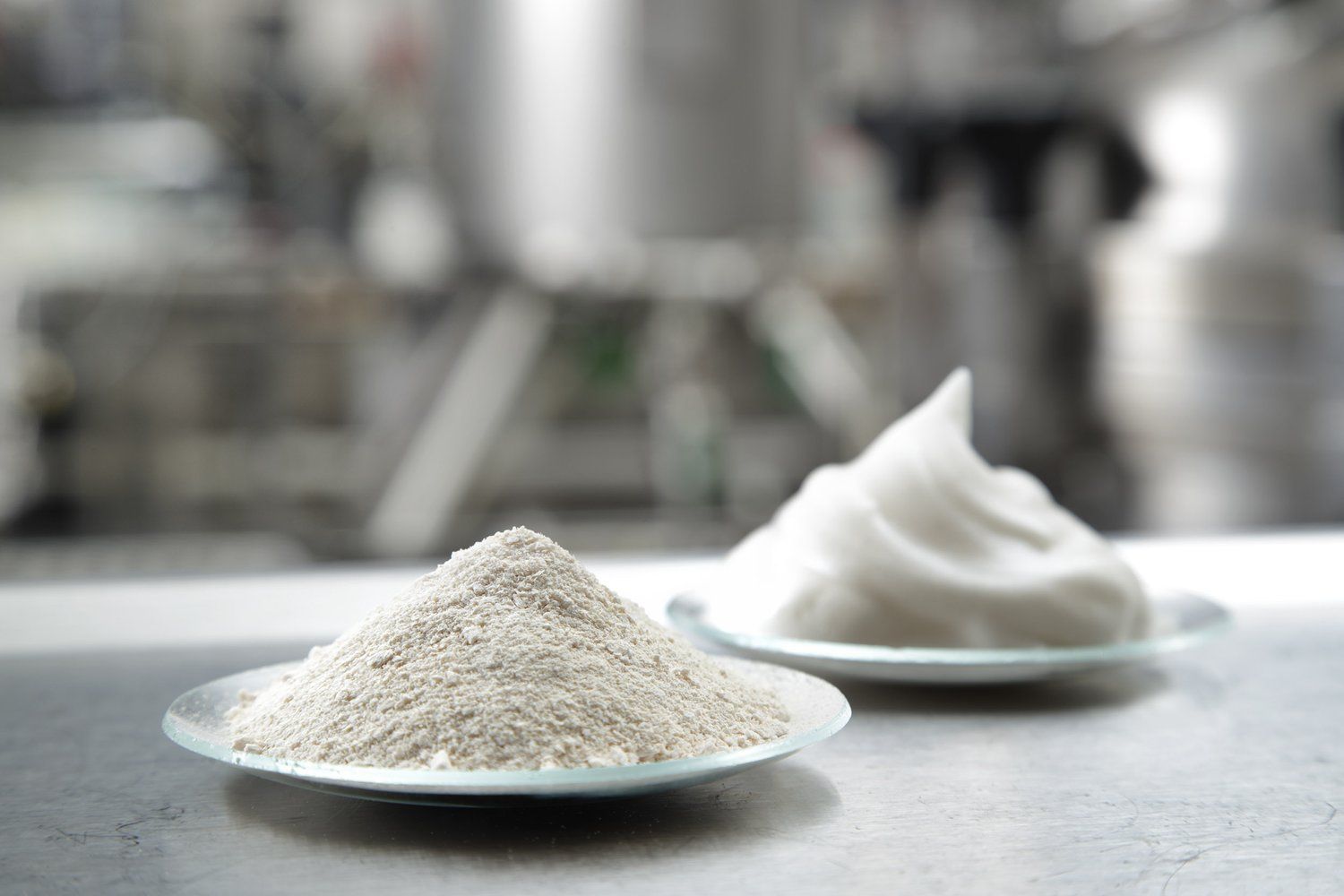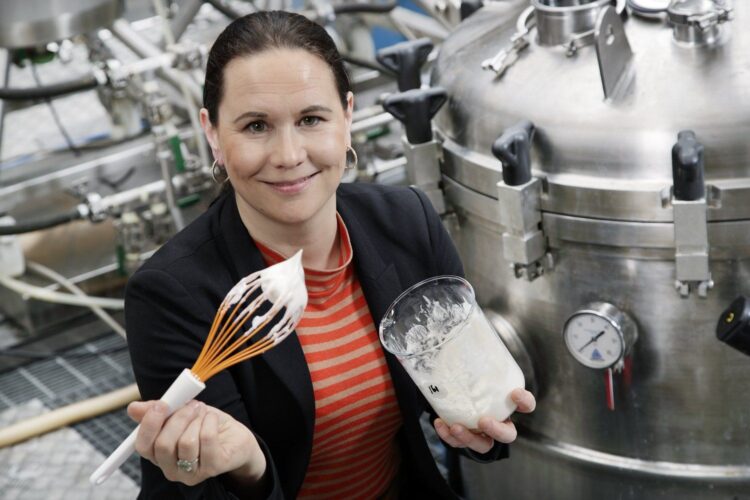While investments in some parts of the alternative protein category have cooled off, the market doesn’t need much convincing that there’s mileage in replacing eggs, says Maija Itkonen, cofounder and CEO of Finnish precision fermentation startup Onego Bio, which makes egg white proteins with microbes instead of chickens.
Food manufacturers, she points out, have been looking for viable egg replacements for years as prices and supplies go up and down like a Yo-yo with every new avian flu outbreak.
Put more bluntly, says Itkonen, while some potential customers and investors care that egg proteins produced via fermentation may be greener and kinder than those produced from factory farming, you don’t have to care about chickens or the planet to buy into what Onego Bio is doing.
At base, manufacturers just want eggs’ functionality and clean label credentials, without the associated hassle, says Itkonen, an industrial designer who made her first move into the food industry in 2015 after cofounding plant-based meat firm Gold & Green.
Gold & Green, which had developed a proprietary process to create fibrous plant-based meat products with oats as the primary ingredient, caught the eye of Finnish food company Paulig, which took a 51% stake in 2016. Paulig then sold the Gold & Green brand, IP and R&D function to Finnish food giant Valio in February 2022, prompting Itkonen to turn her attention to egg proteins.
A year later, Helsinki-based Onego Bio—a spin-off from VTT Technical Research Centre of Finland—has amassed a team of 21 and raised €14.5 million in funding ($15.3 million) through a combination of grants and equity funding.
AFN caught up with Itkonen (MI) to talk about “Bioalbumen,” a trademarked ingredient that is bio-identical to ovalbumin, the primary protein in egg white, which Itkonen and cofounder Chris Landowski are expressing in a genetically engineered strain of fungi in fermentation tanks.
AFN: Why does the world need animal-free egg proteins?
MI: Avian flu has changed the game completely and the situation we’re in now, with egg availability at record lows and prices at record highs, is just going to keep on happening.
For food manufacturers, though, eggs are very hard to replace [with plant-based ingredients] in some applications.
AFN: Tell us about the genesis of Onego Bio.
MI: When I was at Gold & Green we did extensive studies on different binders for plant proteins instead of methylcellulose [which suffers from a less than consumer-friendly name] and everyone would always say, if only there were just something natural and familiar like egg we could use instead? So maybe it was kind of obvious that I ended up looking at egg proteins!
I was introduced to [cofounder] Chris [Landowski] at [Finnish research center] VTT by some people who knew both of us. In Finland, everybody knows each other if you’re working in alternative proteins, and we just started chatting.
Chris is a fungal biologist and he’s been working at VTT with [the filamentous fungus] Trichoderma reesei to produce therapeutic proteins and enzymes for years with very high yields. So although making egg proteins using fungi is new, people have been making proteins with Trichoderma for decades.
Onego Bio has an exclusive license from VTT to use its IP around this.
AFN: There are well-publicized challenges around scaling up precision fermentation for startups. How tough has the last year been?
MI: We’re confident about the technology and the IP and we have the talent and a super-skilled team with experience in manufacturing with Trichoderma. The biggest challenge is regulation and the EU approval system for novel foods.
In the US [where Onego Bio is going through the Generally Recognized as Safe (GRAS) process] it’s okay-ish, but in Europe, the situation is just horrible because it takes so long and it’s not very transparent and you can’t talk to regulators [about your process and what they are looking for] before you make your application.
It’s not that we want an easier system. It has to be challenging because we’re talking about human nutrition. The problem is the speed of the system. But we’re putting a Novel Food application together now with a plan to file it early next year and hopefully get approval in 2025, so we expect we’ll target the US market first.
Trying to navigate the regulatory approval process is one of the key reasons we’ve been working closely with nth Bio [the enterprise biology innovation arm of California-based ‘animal-free dairy’ startup Perfect Day] as it is using the same organism [Trichoderma reesei] as us [and has secured a coveted ‘no questions’ letter from the FDA for its whey protein produced via precision fermentation].

AFN: What has it been like raising money in the current climate?
MI: Last year we raised €10 million [$10.6 million] in seed funding from [UK-based VC firm] Agronomics and [Helsinki-based VC firm] Maki VC and we got a €4.5 million [$4.8 million] grant from Business Finland [a public organization under the Finnish Ministry of Employment and the Economy]. We are also looking to raise a bit more.
Equity-based funding for factory projects is challenging, so [big capex projects] also need to be funded with non-dilutive sources of funding. But there are new organizations around like Climate Fund [a state-owned special-assignment company focused on combating climate change], and we are in a very good position because egg whites and egg proteins are well-known proteins, so you really don’t need to explain anyone why they are needed.
AFN: Chicken eggs contain scores of proteins, but you’re just making one?
MI: Yes, there are all kinds of proteins in eggs. But ovalbumin, the main protein in egg white, has most of the functionality food companies are looking for from egg white and a high-quality nutritional profile.
We’re working with big food processing companies and bakeries to make sure that our product works in their defined applications and to see if they might have to make tiny adjustments to their recipes to achieve the right results.

AFN: When will your products hit the market?
MI: I can’t say much about our manufacturing plans right now but I can say that we have a couple of different partners outside of Finland that have capacity from thousands of liters to tens of thousands of liters. Full-scale manufacturing would be hundreds of thousands of liters.
Our optimistic target is to start selling product to the US market next year.
AFN: What do you call animal proteins that are not made by animals?
MI: I think the term ‘animal-free’ is OK, but we have trademarked the name Bioalbumen, which we think people will see a bit like biogas or bioplastic. Having a brand name helps in the communication, even if we have to call it non-animal egg protein or something like that on the ingredients list.
AFN: You’re a founding member of the new Precision Fermentation Alliance. Why get involved?
MI: Clearly, companies in this field need to join forces. Educating people about what we’re doing is very important because there are perceptions that things made in a laboratory must be artificial or synthetic.
As for GMOs, we’re using a genetically engineered microorganism [as the production platform] but the final product is Non-GMO in the sense that there’s no [modified] DNA left in the final product. But we don’t promote what we’re doing as Non GMO.





